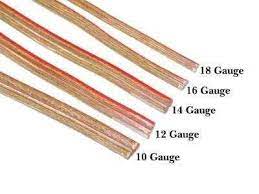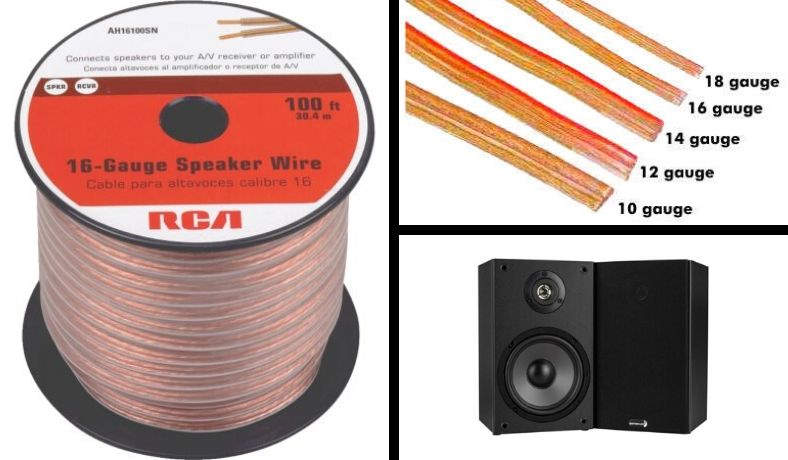14 Vs 16 Gauge Speaker Wire – Making The Right Choice
One of the assumptions most audiophiles make is they can shop for any speaker wire and get the best sound quality from it, but there is so much you have to learn about speaker wires before going ahead to shop for one today.
A speaker wire’s role is connecting an amplifier to a speaker or a receiver to a speaker. Speaker wires function by transporting audio signals found in electric current from a sound source to a speaker.
A speaker wire’s gauge is a point that needs to be considered when shopping for a speaker wire, and the thickness of a wire is what we mean by speaker wire gauge.
The value of a speaker wire gauge indicates the thinner speaker wire, and you must have read the term AWG when reading about speaker wire gauge. AWG represents American Wire Gauge, and it is the standard used in expressing the thickness of a speaker wire.
Content Navigation
Choosing The Right Speaker Wire Gauge
There are several American Wire Gauge’s on the market, with 14 AWG, 12 AWG, and A16 AWG being the most common, and these are speaker wire gauges that can be used in a home theater or stereo sound system setup.
You will learn the difference between the 14 Vs. 16 speaker wire gauges in this article and everything you will read about these speaker wire gauge’s in this article will help you make the right choice when faced with the two speaker wires.
When choosing the right speaker wire, you should consider that the distance the wire has to travel determines how thick the wire you select should be. Longer runs can result in a significant loss of power, and this ends up causing a poor sound quality performance.
Fortunately, this might not be much of a problem in a single-room setup. However, it tends to be a problem in multi-zones and multi-rooms or any outdoor application or setup.
14 Vs 16 Gauge Speaker Wire

The 14 AWG speaker wire has more thickness than the 16 AWG speaker wire, and a standard 14 gauge speaker has a 1.6mm diameter, while the standard 16 gauge speaker has a 1.3mm diameter.
Thick speaker wires are known to have low resistance, and this means that a 14 gauge speaker wire has low resistance compared to a 16 gauge speaker wire. Keeping the resistance low eliminates the degrading of the audio signals passing through the wire.
Electrical signals will find it easy to flow through wider speaker wires, but signals will find it very hard to flow through wires if they are thin or narrow.
It tells you that thinner wires form a strong resistance when audio signals pass through, and the audio signal quality will deteriorate due to high resistance. Therefore, you should consider using thicker wires when using a long cable to connect a speaker to a faraway sound source.
The reason behind using a thick wire is because it will be able to repel resistance, but a thinner speaker wire will get the job done if you are using a cable to connect a speaker to a close sound source.
These points about resistance and distance to sound source need to be carefully considered when shopping for a speaker wire, so you need to pay attention to the distance to sound source when shopping for a speaker wire.
Which is better, between 14 vs 16 gauge speaker wire?

It is okay to find it confusing or difficult when shopping for the right gauge speaker wire for your sound system. So many people are often found in this type of situation, but choosing between the 14 vs 16 gauge speaker wire will depend on certain factors. These factors are;
- Distance between speaker and sound source
- The speaker’s impedance rating
Most speakers on the market have an impedance rating of 4, 6, and 8-ohms. Therefore, you should use a 14 gauge speaker wire to connect to a 4-ohms speaker with a distance of about forty feet.
However, it would help if you connected a 16 gauge speaker wire to a 4-ohms speaker with a distance of twenty-four feet. Likewise, when connecting a 14 gauge speaker wire to a 6-ohms speaker, it should be within the distance of sixty feet.
Connecting the 16 gauge speaker wire, on the other hand, to a 6-ohms speaker should be within the distance of thirty-six feet. When connecting a 14 gauge speaker to an 8-ohms speaker, the speaker should be within the distance of eight feet, while connecting a 16 gauge speaker wire to an 8-ohms speaker should be within forty-eight feet.
Please note that you will obtain poor sound fidelity when you go farther than the distance rating we have provided in this article, and the audio will not be crystal clear.
New post: 5 Best Speaker Wire For Car Audio
Insertion Loss
Insertion loss talks about measuring the loss load of power at the speaker because of excessive resistance loss in a cable. The excessive resistance loss could also come from an additional component used in connecting the loudspeaker and amplifier, and the insertion is expressed in decibels (dB).
There will be power loss in a speaker cable because the speaker isn’t playing as loud as it should, which explains what happens when there is insertion loss.
Final Note – 14 Vs 16 Gauge Speaker Wire
We told you at the start that you won’t only find every piece of information in this article interesting, but we will equip you with the right information that will help you make the right choice when confused about what speaker wire gauge to go for.
Judging from everything here, you can see that just making payment for any speaker wire gauge will not provide you with the sound output quality you desire.
To obtain your desired sound output quality, you need to pay attention to the distance the speaker wire will run and the speaker’s impedance rating.
A speaker wire’s gauge is one factor you should not ignore or look away from, as it will determine the sound output quality you will obtain. One point you should look out for is not compromising on sound quality because of cost.
16 gauge speaker wires are more affordable than a 14 gauge speaker wire because a 16 gauge speaker wire is thinner. However, with what we have mentioned in this article, a 14 gauge speaker wire will offer a better sound quality experience, so do not make your decision based on cost.
Related Posts
How Many keys Are There On A Piano

